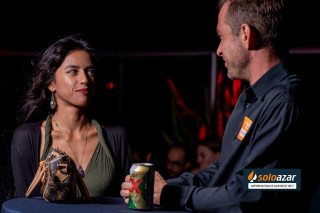Gaming in Spain 2025: Between Explosive Growth, Algorithms, and Public Health Challenges
Monday 07 de July 2025 / 12:00
2 minutos de lectura
(Madrid, Soloazar Exclusive).- During the 2025 Gaming conference in Spain, Mikel Arana, CEO of DJOJ, offered a comprehensive look at the online gaming market. In his presentation, titled "Algorithms, Advertising, and Deposit Limits: Formulas and Obligations," he analyzed the rapid growth of the sector from the operators' perspective, warned about the risks to public health—especially among young people—and explained why regulators must act as a counterweight to a business that grows at the expense of the most vulnerable.

The 2025 Gaming in Spain conference , held on June 26 at the ECIJA Auditorium in Madrid, brought together experts, operators, and authorities from the online gaming sector to discuss the present and future of this booming industry. Among the prominent speakers was Mikel Arana, head of the Directorate General for the Regulation of Gaming (DJOJ ), who gave a presentation entitled "Algorithms, advertising, and deposit limits: formulas and obligations ."
In this article, we summarize the main points of his presentation, which addressed the sustained growth of the gaming market in Spain, the associated risks from a public health perspective, and the role that regulators must play in this complex ecosystem.
A regulated market… that keeps growing
“At first, it may sound as if regulation is holding back the market, but that couldn't be further from the truth,” Arana began. With data in hand, he highlighted that online gaming's GGR (Gross Gaming Revenue) in Spain grew 48% in just two years.
By 2024, the sector added 100,000 new players, reaching a total of 350,000 active users. “I'm not sure how many industries can talk about numbers like these,” he noted. This growth also occurs in a context of heightened legality: “Most players use tax-compliant payment methods and remain loyal to one or two operators. That loyalty is pure gold for any business.”
The social cost: youth at risk and worrying losses
The Director General of the DJOJ was also clear in warning about the social cost of growth. “This growth comes at the expense of the most vulnerable, the youngest,” he stated. In 2024 alone, participation among players between the ages of 18 and 25 grew by 88%. But even more alarming: more than 73,000 of them lost more than 3,000 euros in a single year .
Arana warned that 20% of young gamers are "heavy gamers," meaning they spend more than €600 in three weeks. He explained that this phenomenon is no coincidence: "Affiliate models that profit when their followers lose money, and the use of influencers, are directly affecting younger audiences. Digital marketing has become a risk factor in itself."
New laws for a fairer and safer market
To address these problems, Arana explained that the DJOJ is working on three specific lines of regulation :
- Customer Service Act , currently under debate in Congress, to eliminate aggressive business practices.
- Limitation of payment methods and deposits , with the aim of making over-indebtedness more difficult.
- Obligation to implement a risk detection algorithm , which will be mandatory for all operators in 2026.
"This algorithm is not a recommendation: it will be mandatory. And we're not doing this on a whim, but because the vast majority of operators have ignored current obligations. They only act when the economic cost is low or when the law requires them to," he stressed.
Risk Algorithm: How to Anticipate Problem Gambling
A central part of his presentation was dedicated to the development of the algorithm for detecting at-risk players , a tool based on science and real data.
"We want to build a system with a solid scientific foundation. We don't rely solely on the DJOJ's statistical team; we also work with universities and international experts," he explained.
To train the model, the DJOJ used the gambling histories of 506 people clinically diagnosed with gambling disorders . Eighty-one key variables were defined, inspired by DSM-5 criteria and European standards, capable of detecting patterns such as voluntary exclusions followed by relapses, drastic increases in deposits, or erratic behavior after large wins.
"The goal is simple: to be proactive. If we detect patterns similar to those of diagnosed individuals, we can intervene before further damage occurs," he noted.
The model already achieves an accuracy of over 80% and is currently undergoing validation by academic experts. Its full implementation is planned for the first quarter of 2026.
What happens when a player is identified as a risk?
In response to questions from the audience, Arana explained that identifying a player as at-risk doesn't automatically result in their expulsion from the system, but rather a series of mandatory restrictions.
"The operator must contact you; they cannot consider you a VIP customer or offer you promotions. Enhanced protection tools will be applied," he explained. All of this is contemplated in Decree 163/2023, which has been in force since March of that year.
An industry that must grow responsibly
"This isn't just any business," Arana concluded, explaining that we can't talk about success while we continue to see thousands of young people losing money, time, and well-being.
With a vision based on data, public health, and consumer protection, the DJOJ seeks to set the course for an industry that, while profitable, has an obligation to set clear boundaries and protect those most in need.
Categoría:Events
Tags: Gaming in Spain,
País: Spain
Región: EMEA
Event
iGaming Club Conference Cancun
24 de November 2025
Levon Nikoghosyan Confirms iGaming Cancun’s Success and Future LATAM Expansion
(Cancun, SoloAzar Exclusive).- The vibrant energy of iGaming Cancun has set the tone for a new chapter in the Latin American iGaming industry. Levon Nikoghosyan, CEO and Co-Founder of AffPapa and iGaming Club, shared his enthusiasm for the event’s debut in Mexico, highlighting its impact on the regional market and the company’s ambitious plans for the future.
Thursday 04 Dec 2025 / 12:00
iGaming Club Cancún 2025 Concludes Successfully with Strong Connections in Its First LatAm Edition
(Cancun, SoloAzar Exclusive).- iGaming Club Cancún 2025 came to a close last night with a comprehensive experience of conferences, networking, and the AffPapa iGaming Awards LATAM gala, consolidating itself as a unique space for operators, affiliates, and providers in the region.
Thursday 27 Nov 2025 / 12:00
iGaming Club Cancún 2025: Affiliates, Operators, and Innovation Take Center Stage on Final Day
(Cancun, SoloAzar Exclusive).- The second and final day of iGaming Club Cancún 2025 unfolds today, bringing together operators, affiliates, and select B2B providers in a unique networking and conference environment that highlights the evolving dynamics of the Latin American iGaming market.
Wednesday 26 Nov 2025 / 12:00
SUSCRIBIRSE
Para suscribirse a nuestro newsletter, complete sus datos
Reciba todo el contenido más reciente en su correo electrónico varias veces al mes.




















